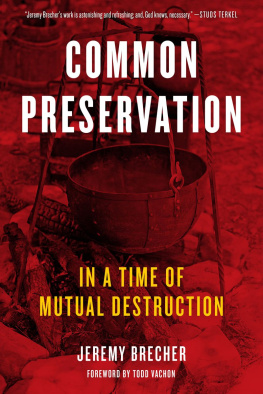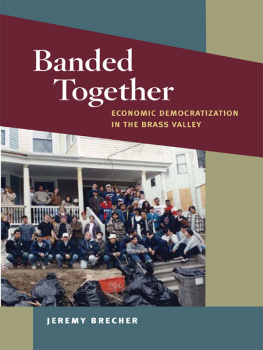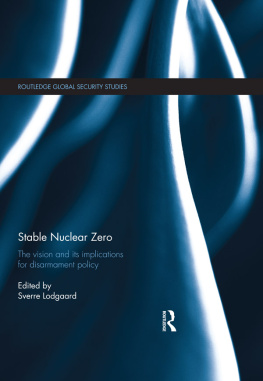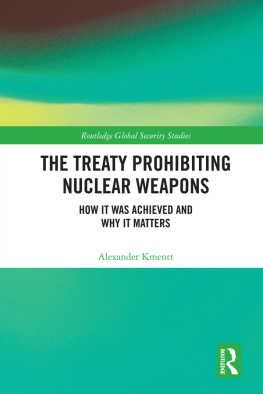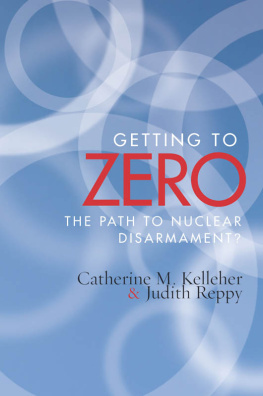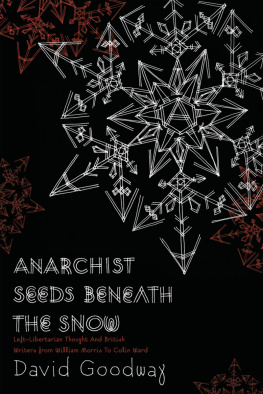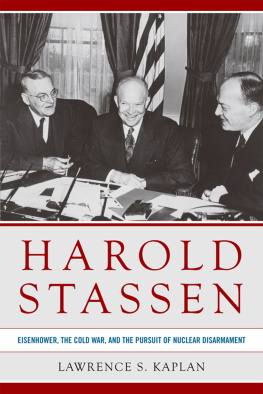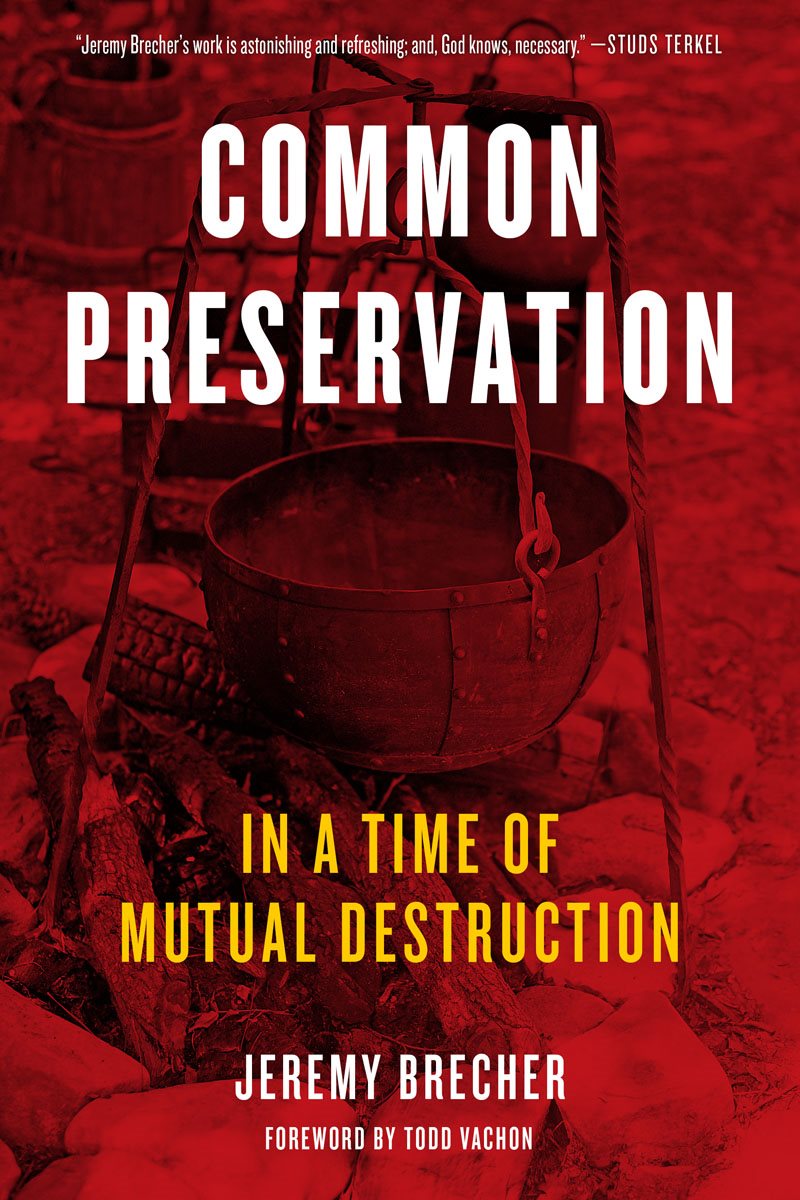
Praise for Common Preservation and Jeremy Brecher
Jeremy Brechers work is astonishing and refreshing; and, God knows, necessary.
Studs Terkel
Chapter by chapter, I learn from it; and I admire its ambition. When I sampled it, it engaged me so much that I set aside other work until I finished it. Overall, a fine manuscript. Rich in content. Also engaging. Is it not all or part of a philosophy or worldview?
Charles Lindblom, Sterling Professor Emeritus of Political Science and Economics at Yale University; author of The Market System
Ever since I read the draft of Common Preservation a year ago, Ive been compelled to urge a surprising variety of colleagues to read it, above all else, to understand the history, the successes, the failures, and the profound lessons to be learned from social justice movements: professional and volunteer organizers and activists, engaged citizens who yearn to be more effective. This history is systematically informed by an extraordinarily broad, cross-disciplinary reach for scholarly works that provide practical insight to the lessons to be learned. I know that I am not alone in finding much scholarly work difficult to relate to my experience as an advocate. By integrating the direct experience of the author with such work, Brecher has enabled me to do just that.
Mike Pertschuk, former chair, Federal Trade Commission
It is an autobiography of intellectual exploration and of practical experimentation with the problems of social injustice. It is a project of the urgent transmission of the lessons learned undertaken under the duress of historical time which threatens catastrophe. It is a valedictory and an exhortation.
Joshua Dubler, Society of Fellows, Columbia University; author of Down in the Chapel: Religious Life in an American Prison
Weve been talking about turning everyday life and its challenges into a meaningful political strategy for ages. Finally Common Preservation succeeds in doing it. Engrossing.
Ferdinando Fasce, author of An American Family: The Great War and Corporate Culture in America
Common Preservation is simultaneously a handbook for understanding the emergence of social movements and a call to action for each and every one of us to join together and address the most imminent threat to continued human existencehuman-caused climate change. Longtime movement scholar, peoples historian, and social activist Jeremy Brecher is just the right author at just the right time to engage with this topic. With a lifetime of participation in movements ranging from nuclear disarmament and peace to civil rights, gender equality, and labor, Brecher is well equipped to address these questions. At the heart of this book is a lifelong passion for progressive social change and a deep thirst for understanding how individuals on occasion come to realize their shared interests and coordinate their efforts to transform the world for the betterment of all. Read. Discuss. Act.
Todd E. Vachon, from the foreword
Common Preservation: In a Time of Mutual Destruction
Jeremy Brecher
2021 PM Press.
All rights reserved. No part of this book may be transmitted by any means without permission in writing from the publisher.
ISBN: 9781629637884
Library of Congress Control Number: 2019946105
Cover by John Yates / www.stealworks.com
Interior design by briandesign
10 9 8 7 6 5 4 3 2 1
PM Press
PO Box 23912
Oakland, CA 94623
www.pmpress.org
Printed in the USA.
Contents
Foreword
By Todd E. Vachon
Common Preservation is simultaneously a handbook for understanding the emergence of social movements and a call to action for each and every one of us to join together and address the most imminent threat to continued human existencehuman-caused climate change. By identifying common patterns between iconic movements like the US civil rights movement and more obscure actions such as a local meat boycott by housewives in Staten Island, Brecher reminds us of how doing historyfinding significant and meaningful connectionscan help us act more effectively now and in the future. As your middle school social studies teacher likely told your class, If we dont know our history, we are doomed to repeat our mistakes. The message from Brecher is more urgent: if we dont learn from our actions and develop new strategies for common preservation immediately, we are doomed to end history altogether.
Common Preservation addresses these central questions:
How might we come to see that our self-interest, indeed our self-preservation, depends upon our common preservation?
How might the billions of individual humans living on the planet today coordinate our efforts and reconstruct our patterns of actions to address the threat to our mutual survival?
Longtime movement scholar, peoples historian, and social activist Jeremy Brecher is just the right author at just the right time to engage with this topic. With a lifetime of participation in movements ranging from nuclear disarmament and peace to civil rights, gender equality, and labor, Brecher is well equipped to address these questions. At the heart of this book is a lifelong passion for progressive social change and a deep thirst for understanding how individuals on occasion come to realize their shared interests and coordinate their efforts to transform the world for the betterment of all. Understanding these processes is more important than ever in this current era when we are facing global pandemic, global depression, accelerating climate crisis, and heightened struggles over justice and equality.
I have seen common preservation, and I know it can work. While I was in graduate school at the University of Connecticut, my fellow graduate workers and I had been accustomed to working for low pay and simply dealing with it as best we could. It was just the way things were, and everyone knew it when they accepted the offer to come to the university. Some took on extra jobs without telling their advisors, others found they were eligible for food stamps and used them to help provide for their family. But when the university began to unilaterally cut benefits and impose further economic hardships on graduate workers, a gap arose between their expectations and the realities they faced. Just struggling along through grad school poverty was no longer working. A small group of grad workers got together and shared our stories of individual efforts to cope with the hardships. We decided to speak with more of our co-workers about their problems, which increased awareness among graduate assistants that what we had been experiencing as individual problems were in fact shared by over two thousand other graduate assistants from all different departments. It was a collective problem that required a collective solution. We ultimately formed an organization to coordinate our actions and address the problema union.
Common Preservation shows that there is a pattern to the emergence of such collective solutions. For example, on March 15, 2019, 1.4 million students from over two thousand cities in 125 countries on six continents made history when they walked out of school. It was the latest in a series of global student strikes urging the governments of the world to act now on climate change. These widespread mobilizations were inspired by the weekly strikes held outside of the Swedish parliament by a lone sixteen-year-old named Greta Thunberg. Like Greta, students around the world expressed fear, anger, and disappointment that adults have not acted on climate change. Addressing a crowd in Santa Fe, New Mexico, eighteen-year-old Hannah Laga Abram said:
Next page
